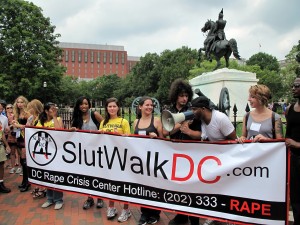
Today, more than one thousand people walked together down 15th Street in Washington, DC, from the white house to the Washington Monument, many were holding anti-rape, anti-victim-blaming signs. I was one of them. Tourists lined the sidewalks taking photos of us, many cheering and encouraging us as we walked.
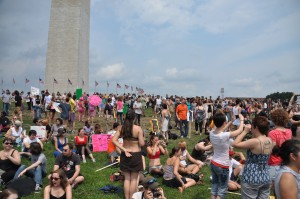 After the walk ended at National Sylvan Theater, hundreds of people gathered on the lawn, with the Washington Monument as the backdrop, to listen to talks by 22 different survivors and activists. I was amazed at the dedication of the audience when a downpour began just moments after the first speaker took the stage. Most members of the audience stood their ground and stayed to listen despite the dark clouds, thunder, and rain. Throughout the talks, the audience was so supportive of everyone, clapping and cheering encouragement and then booing when people mentioned the victim-blaming they have faced.
After the walk ended at National Sylvan Theater, hundreds of people gathered on the lawn, with the Washington Monument as the backdrop, to listen to talks by 22 different survivors and activists. I was amazed at the dedication of the audience when a downpour began just moments after the first speaker took the stage. Most members of the audience stood their ground and stayed to listen despite the dark clouds, thunder, and rain. Throughout the talks, the audience was so supportive of everyone, clapping and cheering encouragement and then booing when people mentioned the victim-blaming they have faced.
Most speakers were survivors and they shared stories about how, after the assault(s), they faced blame from family members, police officers, and friends. Or, many of them said they never reported what happened for fear of being blamed. One speaker made a point of wearing the same outfit today that she wore when a former friend sexually assaulted her. When she reported the crime to the police, they asked her multiple times to describe what she was wearing.
Different speakers shared what sexual abuse means for them as women of color and/or as lesbians, as a man, or as a survivor of multiple rapists. Some speakers shared poems they wrote and a few speakers visibly struggled with their emotions while sharing their very personal story with strangers on the national mall. I was touched by how honestly each survivor shared their pain and also by how their unbreakable, resilient spirit shone through.
Activists who spoke shared resources and information to help people connect and find help. For example, Sasha Ponappa, the executive director of the Deaf Abused Women’s Network (DAWN), told us (through an ASL interpreter) that during the three years since she’s been at DAWN, they’ve helped 400 survivors in the deaf community. She noted that victimization is high and anyone who needs help could visit their booth to get more information and get connected to resources. Lauren Taylor, founder of Defend Yourself, gave a mini verbal and physical self-defense demonstration during her talk and invited people to attend future self defense trainings. Later in the afternoon she gave a free self-defense demonstration at her booth.
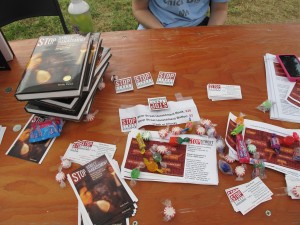
Around the corner from the stage, 20 booths lined the sidewalk, offering people ways to connect with anti-sexual assault, anti-harassment, and pro-consent organizations in the DC area. The DC Rape Crisis Center had a prominent booth and all donations made during SlutWalk DC were given to them. I really appreciated that this SlutWalk allowed people to connect with their local organizations and help them take that “next step” in activism and community organizing.
At the Stop Street Harassment booth, I offered information about what street harassment is, “7 ways to respond to harassers,” and information about accessing this website so people can find resources and ideas for action. I had wonderful staffing help from my very supportive partner, and also from two of my AAUW colleagues Dawn Aldrich and Liz Bolton and one of my former GWU graduate school classmates Helen Luryi (Liz is also a former GWU classmate). During the time I was at the table, it was energizing to talk to people about the issue, hear their stories, and even reconnect with a few people who had heard me speak before. Several people gave me their info so they can get involved the next time there’s a community safety audit in DC.
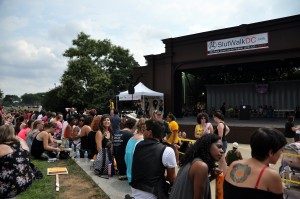 I am so glad I had the opportunity to participate in SlutWalk DC and I’m grateful to Samantha and Shawn Wright for organizing it. They have never organized an activism event like this before but they felt very passionately about the issue and in all of my interactions with them, their sincerity has shown through. I feel like the day was a healing, empowering, and rejuvenating experience for so many survivors and friends and family of survivors and it helped connect a lot of people to community resources and organizations. I also think that the media attention SlutWalk DC received is a very important piece for helping to change the culture of victim-blaming that continues to exist in our society.
I am so glad I had the opportunity to participate in SlutWalk DC and I’m grateful to Samantha and Shawn Wright for organizing it. They have never organized an activism event like this before but they felt very passionately about the issue and in all of my interactions with them, their sincerity has shown through. I feel like the day was a healing, empowering, and rejuvenating experience for so many survivors and friends and family of survivors and it helped connect a lot of people to community resources and organizations. I also think that the media attention SlutWalk DC received is a very important piece for helping to change the culture of victim-blaming that continues to exist in our society.
For more on why I participated in SlutWalk DC, here is the transcript of my talk. (Note: I went off script a bit, so not every part is word-for-word what I said, but most of it is.)
Good afternoon, DC! This SlutWalk is so incredibly inspiring. I’m energized to join you in demanding an end to victim-blaming and slut-shaming. As soon as I learned there would be a SlutWalk DC, I wanted to participate for two reasons.
The first reason, and why I know many of you are here, too, is to honor of the survivors of sexual violence that I know and love. In particular, I am here because of my grandmother. In this photo she is 3 years old. Her father was already sexually abusing her. At age 12, a lifeguard raped her. Then as a young teenager, she told her Mormon Church leader about the abuse, and he sexually assaulted her instead of helping her.
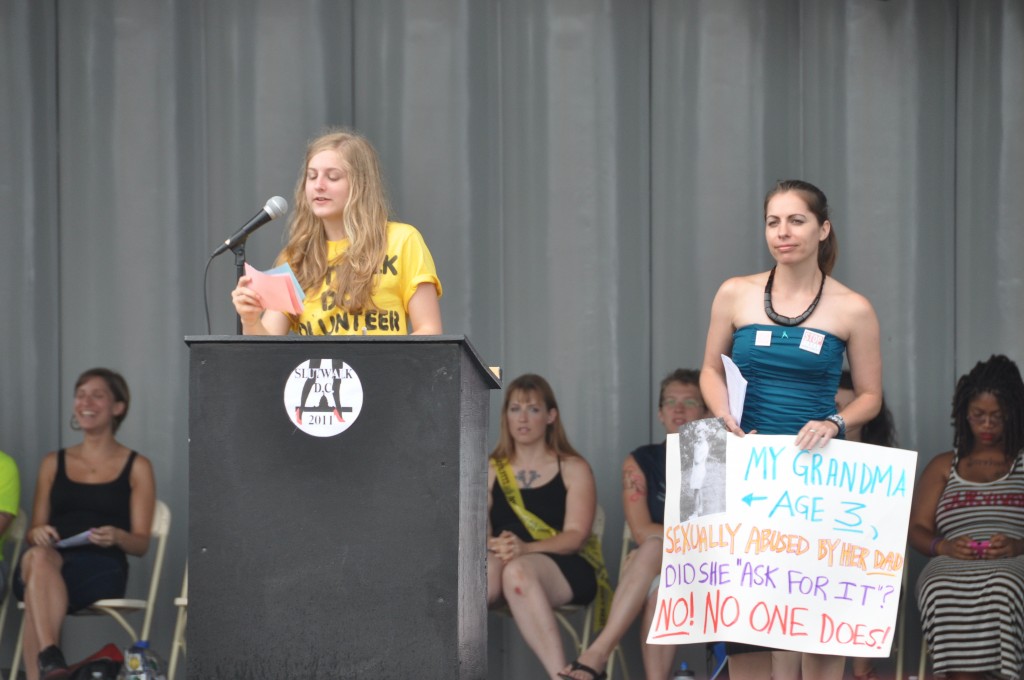
For decades after that she was silenced by shame and the fear of blame. Its negative effect on her life is still apparent today. Recently she wrote the book The Illness that Healed Me about her healing process with the hopes of being able to help other survivors. Because she talks about the abuse by her father, some of her siblings won’t speak to her. She, like all rape survivors, never “asked for it.” They should never be blamed or shamed.
The second reason why I’m here is because the mission of SlutWalks relates to the work I do around street harassment. Just as blaming a sexual assault or rape survivor is never okay, it’s never okay when it comes to street harassment.
For those unfamiliar with the term, street harassment ranges from whistling and “catcalls” to sexual comments, flashing, stalking, groping and assault. Since middle school, most of these have been my experiences and studies show it’s the experience of more than 80 percent of women, especially when they are young.
Street harassment is a form of gender violence; just like with sexual assault, it involves a power imbalance and disrespect for the target. When street harassment occurs, it may remind the target, especially women, that they are vulnerable to rape. To rape survivors it can feel retriggering. And for some people, street harassment actually escalates into sexual assault or rape.
It’s also a gender equality and human rights issue because it limits women’s access to public places. In my research I found that some women have changed jobs, moved neighborhoods, and quit hobbies because of harassers. More commonly, women may feel they have to constantly assess their surroundings when they’re in public alone and they may wear headphones and sunglasses to deter harassers.
Despite its documented prevalence and negative impact, too often people say street harassment is a just a minor annoyance, it’s a compliment, or it’s the fault of the harassed individuals because of the way they dress. But focusing on women’s clothing misplaces the blame for the harassment and it doesn’t make sense.
In Egypt and Yemen, where women are modestly dressed and often veiled in public, more than 80% and 90% of women, respectively, face street harassment. Last month, women in Afghanistan organized the first ever anti-street harassment march in Kabul and, wearing their hijabs, demanded an end to the daily harassment they face on the streets simply for being female. Women who share street harassment stories on my website StopStreetHarassment.org often note what they were wearing when harassed: winter jackets, school uniforms, and business suits as well as skirts and dresses.
For me, it’s running clothes. Since 8th grade, I’ve run almost daily, on school teams and alone and I ran my first marathon at age 14. I’ve faced harassment from hundreds of men I do not know. Whistling, honking, comments including, “I like the way your tits bounce when you run,” and even stalking. Just last week when I was on vacation in Montana, two men verbally harassed me during my run. Harassers don’t care if you’re on vacation.
When I run, I’m usually red and sweaty! Just like with other forms of gender violence, street harassment is not about what we wear or how we look. It’s about disrespect and it’s an abuse of power.
But we are taking back that power with our activism, with our SlutWalks and by refusing to be silent. We are creating power by being here today and walking and speaking out together. We must continue to use this power. Let’s demand that our leaders and peers stop telling us to change the way we dress and instead focus more energy and resources on prevention programs!
To conclude, fellow SlutWalkers, keep raising your voices, dressing as you like, and helping to create the changes you want to see. Thank you.

Joette Hartley Armbruster says
Holly, I am so proud of you for supporting this worthy cause. I was a victim of sexual abuse at a very young age by the husband of one of my aunts. Like many other victims I did not say anything because the man who abused me happened to be my alcoholic father’s main drinking buddy. I kept quiet and thought that I had overcome it but recently have had to enter therapy because of some destructive behavior I am currently experiencing. I am currently trying to start a ACOA (Adult Children of Alcoholics) support group in my area to help others that have suffered the consequences of alcohol abuse. I also want to purchase your grandmother’s book. I think it will help me to read about her experience and how she was able to overcome it. Thank you so much, Holly, for the important work you do to expose the perpetrators of this behavior and to offer support and hope to their victims.
Janice M. Weinheimer says
Holly, I am so proud of the great work you are doing. You are truly a spokesperson for many and you are creating a magnetic energy that will be a catalyst for healing for those who have been sexually abused or harassed on the streets. Beyond that, you are in a very preventative work as you struggle to educate all about the devastating effects of both sexual abuse and street harassment. Your Aunt Jackie has been harassed multiple times at the rec center where she goes to do her daily workouts. Being a survivor of kidnapping, this has added greatly to her anxiety/panic/stress. Your work is empowering those who could be victims to own their voices/power and to speak out against such acts, and to take back their rights as a part of humanity. Keep up the good work. You are in a very precious work of “saving lives”. If you can prevent even one person from going through a lifetime of devastation such as I and other survivors of sexual assault have suffered, it would be more than worthwhile. As I follow your work, I know you are doing much more than that. I shed tears as I read your article because I do know what it feels like to live a life of shame feeling there is something wrong with you when in reality it’s the perpetrators who need to be educated and have their controlling ways exposed and their power rescinded. May you have the energy to continue this great work. Love you! Grandma
HKearl says
@Joette, thank you for sharing your story. I’m so sorry that happened and that you’re going through a tough time right now. I hope you can form an ACOA in your area, I’m sure there are others who could use the help and support and could offer it to you, too. Yes, do check out my grandma’s book!
@Janice, thanks Granny Janny. I appreciate your kind words and admire your courage to speak out and write about your experiences even though it was tough. You’re very brave!
Alan says
Holly, another amazing event. Thank you for all you do to inspire us to want to be better and to create a safe place for people to share their stories and access resources to help them deal with the horrific things they have had to endure.